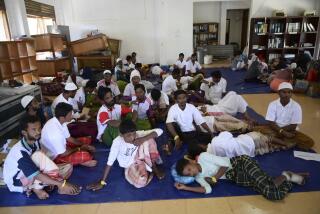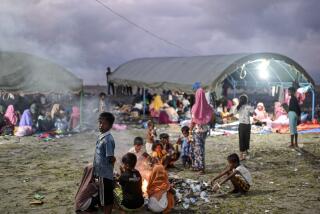Health Risks Feared for ‘Boat People’ at Bleak Island
- Share via
HONG KONG — Huddled on a ramshackle fishing boat moored near the desolate island of Tai A Chau in the territorial waters of this British colony, 22-year-old Hoang Man Nghia explained in two words Wednesday why he joined the latest tide of “boat people” from Vietnam to wash up in Hong Kong.
“For freedom,” said Hoang, a coal miner from Haiphong in northern Vietnam.
But for Hoang and about 74 other men, women and children, the flight to what they had hoped would be a better life has ended for now at Tai A Chau, the largest of the Soko Islands group, about 18 miles southwest of Hong Kong Island.
Two vessels carrying Hoang and the others were intercepted by Hong Kong police launches Tuesday night and towed to Tai A Chau, where, despite health concerns, the Vietnamese were forced to remain on board. They were still under police guard Wednesday and prevented from going ashore.
The Hong Kong government, overwhelmed by its largest influx of boat people since 1979--nearly 10,000 people arrived here by boat in May--decided Tuesday to send all new arrivals to this former fishing village, which has only two permanent residents and no running water or electricity. Already, boats with about 270 refugees have been towed here.
The authorities plan to detain all boat people at the remote island until space becomes available at one of a dozen detention centers operated by Hong Kong, which has been a port of first asylum for Southeast Asian refugees since 1979. They will supply water and dry food on the island, or give provisions and fuel to any boatload of refugees willing to sail on.
The decision to hold the asylum-seekers at Tai A Chau has alarmed refugee officials and international relief workers here, who say the unsanitary conditions will lead to serious health risks. Some question whether the Hong Kong authorities have exhausted all the possibilities of finding shelter for the boat people.
“Clearly, people can’t live without any shelter at all,” a Western refugee aid official said in Hong Kong. “We are very concerned and we are trying hard to find out what the situation is.”
Reception Center Full
According to Michael Hanson, Hong Kong’s refugee coordinator, the government had no choice but to detain new arrivals at Tai A Chau because the reception center at Green Island was full. Built for 700, it is currently trying to cope with 1,500.
An additional 1,500 are housed on ferries moored at Stonecutter’s Island, in Hong Kong harbor. The Soko Islands could be turned into a permanent detention center, Hanson said, but added that it is uncertain whether the government, facing mounting pressure from Hong Kong residents to turn away the boat people, would be willing to go to the expense of building a new camp.
“We simply have no accommodations left for boat people,” Hanson said. “We have no more room.”
The government has speeded up its screening of boat people to weed out political refugees from those simply fleeing to seek a better life. Nearly a year ago, Hong Kong instituted a policy that grants refugee status only to those who can prove they fled political persecution.
More than 35,000 Vietnamese are in Hong Kong detention camps, of whom 18,000 who arrived after June 16, 1988, are subject to screening under the new policy. So far, about 1,400 have been screened and 163 have been declared refugees. About 140 have returned voluntarily to Vietnam.
The surge in refugees to Hong Kong comes just weeks before an international conference in Geneva to re-examine a 1979 international agreement that established Hong Kong, Malaysia, the Philippines and Thailand as places of first asylum for Southeast Asian refugees.
Hong Kong wants to send those who fail to qualify for asylum back to Vietnam but so far has resisted a policy of mandatory repatriation.
Albert Fan, the Hong Kong director of Oxfam, a London-based refugee aid society, said that “things are getting out of hand.” But Fan, who has written three reports criticizing Hong Kong’s treatment of refugees, acknowledged that the government has run out of options.
At Tai A Chau on Wednesday, Hoang said he left Vietnam about a month ago. The boat he and 48 others were on capsized off the coast of China, but Chinese authorities allowed them to buy another vessel that would carry them into Hong Kong waters, he said.
Hoang, an ethnic Chinese, said Hong Kong authorities had provided an adequate supply of water and food, mainly dry goods such as biscuits. But, he said, most of his companions found the food distasteful.
His chief complaint was about shelter. His group of 75 refugees was jammed onto two boats about 50 feet long and 10 feet wide that provided little protection from the sun, wind and rain, he said.
More to Read
Sign up for Essential California
The most important California stories and recommendations in your inbox every morning.
You may occasionally receive promotional content from the Los Angeles Times.














